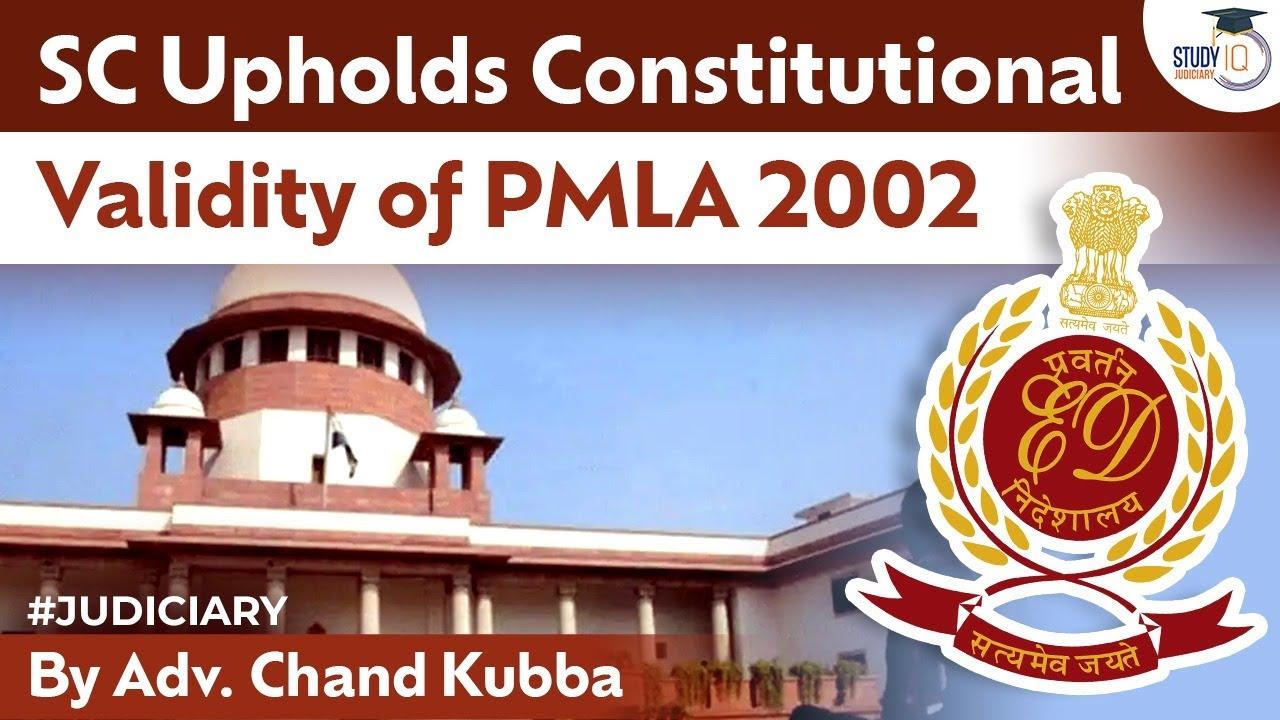Table of Contents
SC Upholds the Constitutionality of PMLA 2002
Money laundering
- the process of concealing the origin of money, often obtained from illicit activities such as drug trafficking, corruption, embezzlement or gambling, by converting it into a legitimate source.
Prevention of Money Laundering Act 2002
- An act to prevent money laundering and to provide for confiscation of property derived from or involved in money laundering and formatters connected therewith.
Enforcement agency
- the Directorate of Enforcement under Department of Revenue, Ministry of Finance is responsible for administering the act.
Background
- A batch of 241 petitions challenging the validity of the law disposed off.
- Constitutionality of Various provisions of the law were challenged in these petitions
No need to provide ECIR while Arrest-
- “ECIR (Enforcement Case Information Report) cannot be equated with FIR and ECIR is an internal document of ED, hence
Supply of ECIR to accused is not mandatory and only disclosure of reasons during arrest is enough.
3. Offence of money-laundering.—
- Whosoever directly or indirectly attempts to indulge or knowingly assists or knowingly is a party or is actually involved in any process or activity connected with the proceeds of crime and projecting it as untainted property shall be guilty of offence of money-laundering.
- “The interpretation suggested by the petitioners that only upon projecting or claiming the property in question as untainted property that the offence of Section 3 would be complete, stands rejected,“
- “We are clearly of the view that the expression “and” occurring in Section 3 has to be construed as “or”, to give full play to the said provision so as to include “every” process or activity indulged into by anyone,“
On Section 5 – attachment of property involved in money-laundering.-
- Section 5(1) of the Act which empowers the Director or Deputy Director to provisionally attach a property for 180 days if he has ‘reason to believe’ that;
- a) any person is in possession with the ‘proceeds of crime’;
- b) such ‘proceeds of crime’ are likely to be concealed, transferred, or dealt with in any manner which may result in frustrating the proceedings related to confiscation of such ‘proceeds of crime’.
- Thus, the suspected proceeds of crime can be seized from the possession of any person irrespective of the fact that whether the person had been indulged in any money laundering process or whether it was he who has or has not acquired, the ‘proceeds of crime’.
- How ever some provisos have been inserted in the Act which try to limit the discretionary powers of the Officers.
- SC Held that section 5 is constitutionally valid
- “It provides a balancing arrangement to secure the interests of the person as also ensures that proceeds of crime remain available to be dealt with in the manner provided under the Act. The procedural safeguards as delineated are effective measures to protect the interests of persons concerned.”
24 Burden of proof
- When a person is accused of having committed the offence under section 3, the burden of proving that proceeds of crime are untainted property shall be on the accused.
- In Criminal cases it is on prosecution, so this section was challenged.
- SC held that Section 24 has reasonable nexus with the purposes and objects sought to be achieved.
On Section 50 (statements by accused to ED)
- Section 50 empowers the Investigating Officer to summon and record the statements of persons concerned and also to make a note or inventory of such records or property.
- ED officials are not police officers.
- Statements made by accused to ED officials are not hit by Article 20(3) which lays down rule against self-incrimination.
- “At the stage of issue of summons, the person cannot claim protection under Article 20(3) of the Constitution. However, if his/her statement is recorded after a formal arrest by the ED official, the consequences of Article 20(3) or Section 25 of the Evidence Act may come into play to urge that the same being in the nature of confession, shall not be proved against him”

























 WhatsApp
WhatsApp